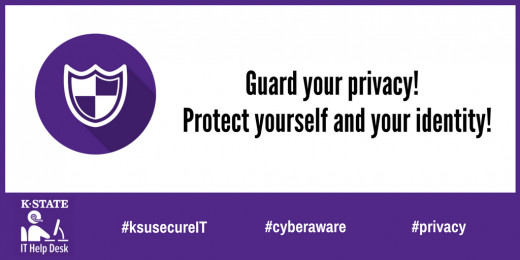According to the US Department of Justice, more than 17 million Americans were victims of identity theft in 2014. EDUCAUSE research shows that 21 percent of respondents to the annual ECAR student study have had an online account hacked, and 14 percent have had a computer, tablet, or smartphone stolen.
At K-State during 2016, 2655 phishing scams were reported resulting in 1213 compromised accounts.

Online fraud is an ongoing risk. The following tips can help you prevent identity theft.
- Read your credit card, bank, and pay statements carefully each month. Look for unusual or unexpected transactions. Remember also to review recurring bill charges and other important personal account information.
- Review your health insurance plan statements and claims. Look for unusual or unexpected transactions.
- Shred it! Shred any documents with personal, financial, or medical information before you throw them away.
- Take advantage of free annual credit reports. In the US, the three major credit reporting agencies provide a free credit report once a year upon request.
- If a request for your personal info doesn’t feel right, do not feel obligated to respond! Legitimate companies won’t ask for personal information such as your social security number, password, or account number in a pop-up ad, e-mail, text, or unsolicited phone call.
- Limit the personal information you share on social media. Also, check your privacy settings every time you update an application or operating system (or at least every few months).
- Put a password on it. Protect your online accounts and mobile devices with strong, unique passwords or passphrases.
- Limit use of public Wi-Fi. Be careful when using free Wi-Fi, which may not be secure. Consider waiting to access online banking information or other sensitive accounts until you are at home.
- Secure your devices. Encrypt your hard drive, use a VPN, and ensure that your systems, apps, antivirus software, and plug-ins are up-to-date.
If you become a victim of identity theft:
- Change your passwords for everything.
- Turn off your computer and alert your system administrator who will check to determine if any malware has been put on your machine and remove it. If you don’t have a system administrator, contact the IT Help Desk at 785-532-7722.
- Check email forwarding to determine if it has been changed.
- From your eProfile page, check your alternate email address to ensure it hasn’t been changed.
- Check your eID password reset options to verify that they haven’t been changed.
- File a report with the US Federal Trade Commission at IdentityTheft.gov.
- Use the identity theft report to file a police report. Make sure you keep a copy of both reports in a safe place.
- Flag your credit reports by contacting the fraud departments of any one of the three major credit bureaus: Equifax (800-525-6285), Experian (888-397-3742), or TransUnion (800-680-7289).
Source: Adapted from Educause Campus Security Awareness Campaign
If you have any questions about identify theft, contact the IT Help Desk, helpdesk@k-state.edu, 532-7722.